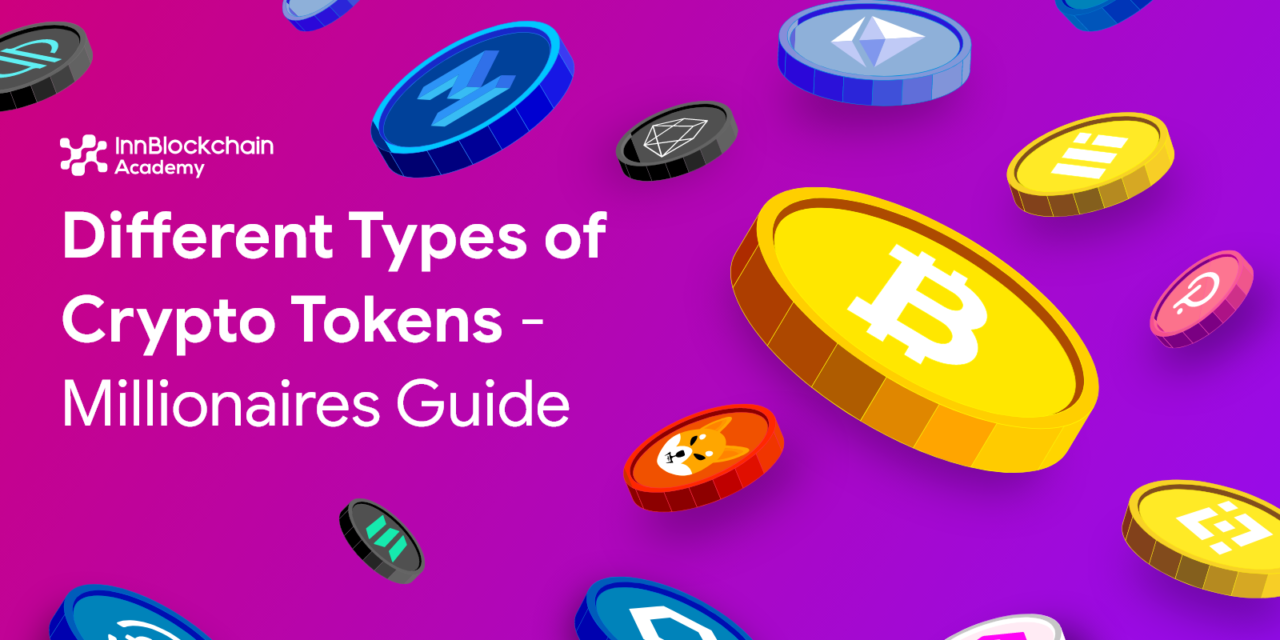Introduction
Recently, cryptocurrency has gained traction to invest, store, and transfer values. For all these, you can use different types of crypto tokens – digital assets that denote a particular unit of value and can trade easily on various platforms.
But all tokens don’t have equal value – there are various kinds of tokens with unique characteristics and use cases.
In this blog, we will dig deeper into different types of crypto tokens like platform tokens, Transaction tokens, Utility tokens, Security tokens, Governance tokens, Fungible tokens, Non-fungible tokens, Defi tokens, Payment tokens, Exchange tokens, and Privacy tokens with an example.
But first, let us begin from the basics 👇
What is a crypto token?
A crypto token is a representation of a digital asset that functions as a unit of value in a cryptocurrency network. The crypto token is developed with blockchain technology, a decentralized ledger that transparently and securely records all transactions over a network of computers.
Generally, you can use crypto tokens to raise funds for projects. Likewise, you can use these tokens to create, distribute, sell, & circulate via the ICO process, which involves a crowdfunding round.
Why invest in crypto tokens?
The most common doubt of crypto beginners is whether it is valuable to invest in crypto tokens. As a matter of fact, yes! The value of crypto tokens is increasing with the rise in tokenization trends. Crypto tokens are a class of digital assets. They are highly compatible with cryptocurrencies. Crypto tokens represent any kind of physical asset, service, or utility alongside digital assets. Crypto tokens represent assets like art, real estate, etc. on the blockchain network. As the crypto industry showcases new crypto tokens for various new functionalities of assets, this ultimately increases the value of tokens.
Next, let’s move to explore various types of crypto tokens….
Types of Crypto Tokens
Platform Tokens
Platform tokens utilize the blockchain to offer decentralized applications for several purposes. With the help of blockchain, platform tokens protect and facilitate transactions. Platform tokens run a gamut of use cases, serving various sectors, from digital collectibles and gaming platforms to marketplaces & advertising industries.
For example, Cosmos is a decentralized platform that facilitates apps and services to communicate with each other across various blockchains. Moreover, ATOM is its platform token that allows the network to operate. Some other examples are Chainlink (LINK), Cronos (CRO), and SushiSwap (SUSHI).
Transactional Tokens
Transactional tokens act as a medium of exchange to facilitate transactions on the blockchain network. It is one kind of traditional money that offers many benefits than Fiat currencies. It provides a straightforward and fast way of transferring money. In most cases, they function like conventional currencies. Nevertheless, they provide more benefits. Generally, the transaction fees associated with these tokens are lower than financial institutions, which allows individuals to carry out various transactions. Moreover, all global supply chains and industries use transactional tokens to experience smart contracts and the immutable nature of the blockchain in their operations.
Bitcoin is the cheapest and most effective money transfer, hence, it is considered a transactional currency. Here, users can execute transactions without a central authority like a payment gateway or bank. Bitcoin’s inception led to the creation of numerous transactional currencies with low transaction fees and high transaction speeds.
Here, let me share examples of notable cryptocurrencies with low fees and high transaction speeds, which make them stand out as means of value transfer.
For example, the POA network creates xDai, one of the tractional tokens that lives on a sidechain, facilitating fast, inexpensive transactions. Some other examples are Stellar (XLM), Alchemy Pay (ACH), and Litecoin (LTC).
Utility Tokens
Utility tokens are digital assets that allow users to access specific blockchain products or services. ICOs are a famous method for Web3 companies to disperse these tokens to the public to develop capital for new projects. Users prefer to utilize utility tokens to buy services or products or to acquire access to specific features or functionalities in an ecosystem. Utility tokens are similar to vouchers or coupons, which reflect monetary value. The buyer exchanges the utility token to gain access to specific services or goods.
For example, ApeCoin (APE) is one of the utility tokens specially created for the Bored Ape Yacht Club ecosystem. It allows holders to take part in the project’s governance votes and also provides access to members-only features like events, games, and other services. Some other examples are Decentraland (MANA), Enjin Coin (ENJ), Cardano (ADA), Basic Attention Token (BAT), and Filecoin (FIL).
Security Tokens
Security tokens are digital assets that operate on the blockchain network. This token denotes the ownership of a tangible asset like stocks, real estate, or bonds. Particularly, these tokens replace traditional means of investment such as bonds or stocks by providing investors with fractionalized ownership through digital tokens.
Unlike a share of stocks, the value of a security token is proportional to the asset’s value. Tokens denote ownership of off-chain assets such as outstanding bills, real estate, equipment, or companies. Moreover, the funding campaign also utilizes security tokens. These tokens live on the blockchain so that everyone can view them and refer back.
For example, BCAP is one of the Ethereum-based smart contract tokens, which is the first tokenized venture fund by Blockchain Capital. Some of the cryptocurrencies used as security tokens are Siacoin, Props token, and Blockchain Capital.
Governance Tokens
As decentralized protocols continue to evolve, the requirement to refine the decision-making processes around them is crucial. On-chain governance facilitates all stakeholders to vote, debate, and collaborate on how to handle a system. Governance tokens power blockchain-based voting systems, as they are utilized to signal support for proposed changes and to vote on new proposals. Most blockchain developers prefer to use tokens in DeFi projects and DAOs.
For example, MKR is the governance token of MakerDAO. MKR holders could vote on proposals to alter the platform’s monetary policy and risk management and enhance the smart contracts that govern the platform. Some of the cryptocurrencies that are utilized as governance tokens are Aave, Maker, and Uniswap.
Fungible Token
A fungible token is one type of digital asset which can be exchanged with other units of the same type. Fungibility facilitates the interchangeability and exchange of tokens without creating any impact on their utility.
For example, Ether is the native token of Ethereum. These cryptocurrencies are identical in value and you can simply exchange them with another unit of the same type. Some of the other examples are Bitcoin (BTC), Ripple (XRP), Litecoin (LTC), and more.
Non-Fungible Tokens
Arguably, the most well-recognized crypto token is an NFT. This token is a cryptographic asset that can create with the help of blockchain. You can’t trade or exchange NFTs with other crypto tokens, each has its own value. NFT represents all kinds of realms like art, music, tickets, in-game items, and more collectibles.
The unique thing about NFT is that it offers holders numerous benefits like access to digital & physical goods, voting rights to token-gated establishments, and access to event mentors. Moreover, you can revise NFTs and can add utilities at any time. But there is no limitation to what NFTs stand for or provide to holders.
For example, CryptoPunks is one of the first NFT projects created on the Ethereum blockchain. It revolutionized the NFT and was also seen as a solid blue-chip investment. Some of the other examples are Axie Infinity and Beeple.
Defi Token
Defi tokens are created especially for use with decentralized platforms that operate with the help of smart contracts. It has various uses, like offering collateral for loans, liquidity for trading, and allowing users to take part in yield farming. This kind of token allows users to access data that exists outside of the blockchain by integrating data into the network.
For example, Chainlink (LINK) allows smart contracts to connect securely to external data sources, facilitating real-world data & events to be integrated into the blockchain. Some of the other examples are Uniswap (UNI), and Aave (AAVE).
Payment Token
Payment tokens are generally referred to as “crypto.” You can use these tokens to buy and sell assets and pay for blockchain-based transaction fees without the need for an intermediary. Technically, most of all cryptocurrencies are used as payment tokens, as they are utilized as a form of exchange. You can use Payment tokens only for payments, so they won’t offer holders additional utility beyond their monetary value.
For example, Ethereum (ETH) is used as a payment method for blockchain-related purchases like NFTs and is also used for real-world payments. Some other examples are Bitcoin (BTC) and Solana (SOL).
Exchange Token
To be precise, an exchange token is a kind of cryptocurrency. You can use these tokens to improve the exchange’s liquidity and motivate people to utilize their platform. Moreover, exchange tokens are the most volatile kind of cryptocurrency on the market. On the exchange, you can use these tokens to pay transaction fees. Less commonly, they are utilized as a governance token to provide holders with voting power for the future development of the platform.
For example, Binance USD (BUSD) is presented by Binance Exchange and backed by the US dollar reserve. It is entirely collateralized and subjected to quarterly audits to confirm the reserve’s integrity. BUSD is frequently used for transfers, payments, trading, and as a store of value. Some of the other examples are FTX (FTT) and Crypto.com (CRO).
Privacy tokens
Privacy tokens are cryptocurrencies utilized for privacy applications as their code promotes better privacy than Bitcoin and mainstream crypto. There are numerous reasons, one of which is to require better privacy in crypto transactions. First, as a right to privacy, security investigations, & highly sensitive transactions, as they are utilized for crime and scams. These tokens include various techniques, like the anonymity technique, to provide transaction privacy.
For example, Monero is an open-source, privacy-focused cryptocurrency developed on the PoW blockchain. It utilizes various techniques to cover transactional details and encourage anonymity. Some of the other examples are Dash, Secret Network, Zcash, and Horizen.
I hope you understand the various types of crypto tokens, now let’s see about their business benefits.
Business Benefits of Crypto Token
- Token sales facilitate a way for businesses to increase capital directly from a global audience without third parties like traditional venture capital.
- Tradding tokens on cryptocurrency exchanges, which ultimately increases the business’s liquidity and a broader investor base.
- Blockchain-based tokens automate and streamline business processes by minimizing transactional & administrative costs.
- Blockchain’s immutable nature improves accountability and trust in transactions and supply chains, facilitating transparency with stakeholders.
- Tokens create incentive mechanisms within a business ecosystem, awarding users for their behavior, actions, or contributions.
- Embedding smart contracts facilitates programmable functionality like automated royalty distribution or conditional payments.
- Token could help develop a strong and engaged community over a platform or project, providing collaboration and growth.
These are a few promising business benefits. Proper planning, compliance, & risk management are necessary for harnessing these advantages effectively.
Final Words
I hope the above classification gives you an understanding of the nature of different types of crypto tokens and the legal obligations that arise from issuing and transacting with them. Moreover, the power of smart contracts tailors the crypto token for various decentralized applications and projects. I assure you that joining any business on the blockchain will definitely be a profitable decision for you. To start a crypto business, you can undoubtedly approach a Token development company to get more details about starting a business.


